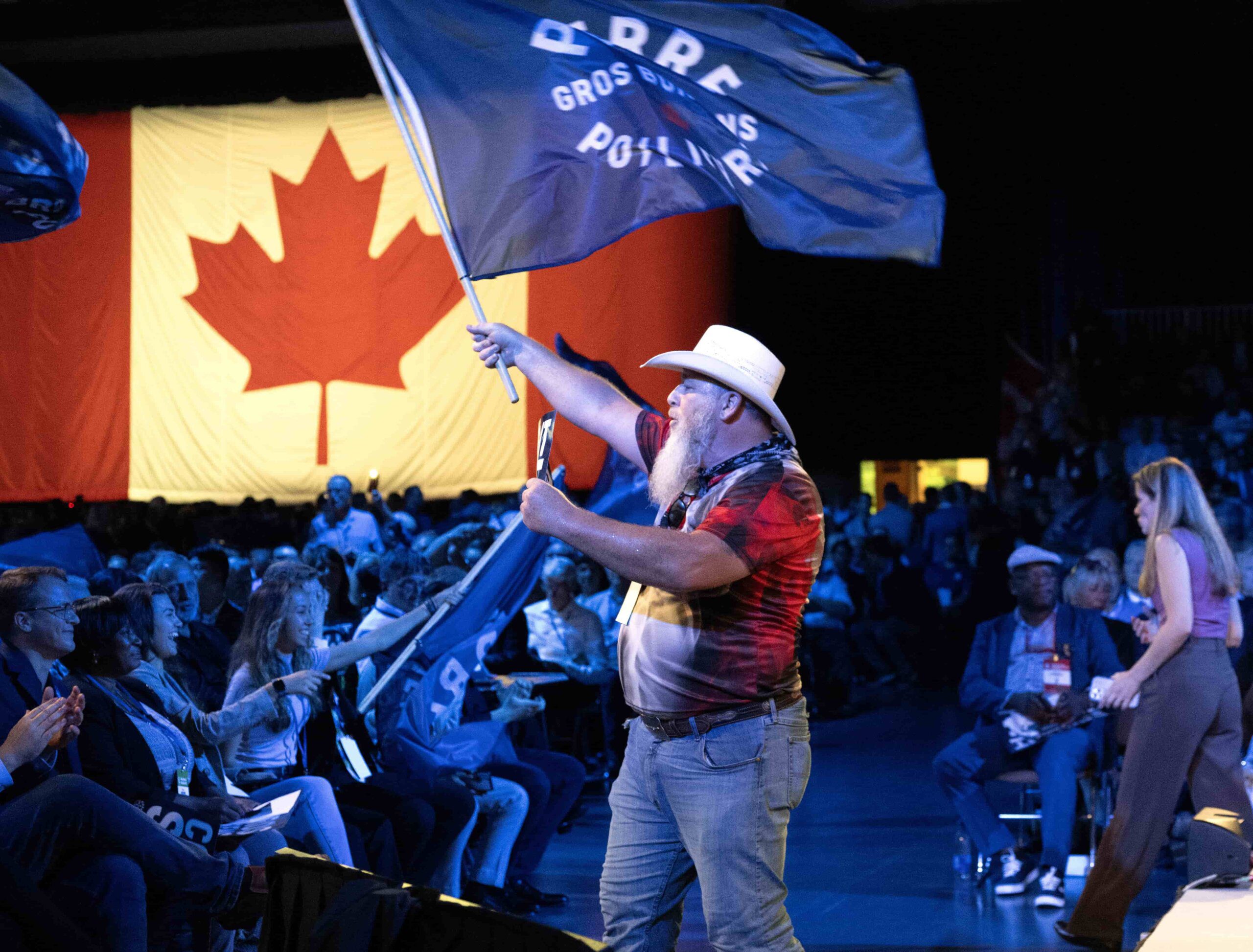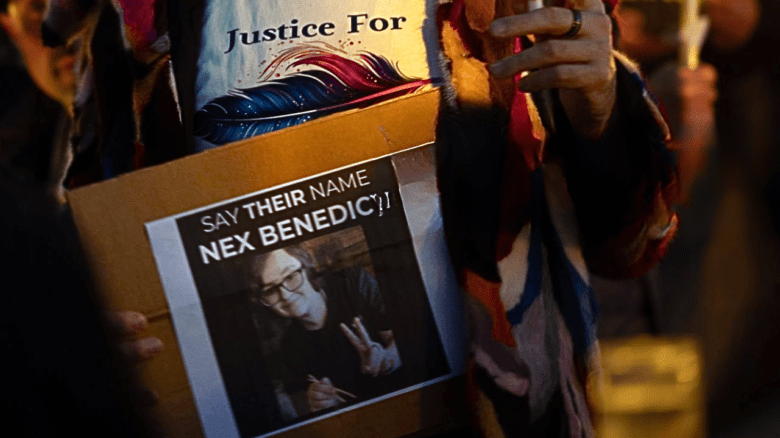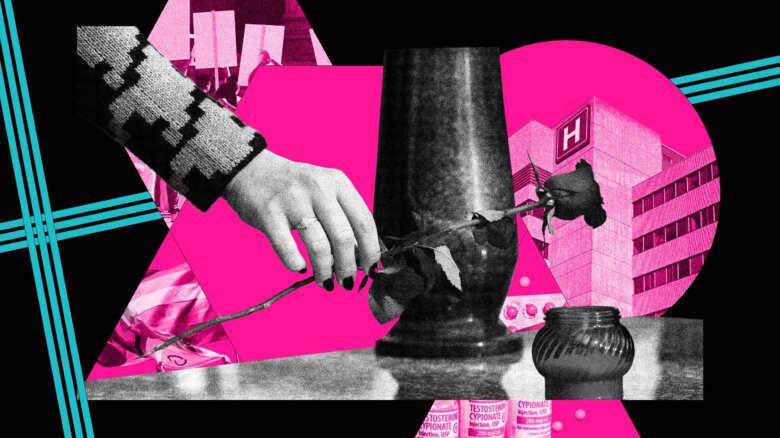The war against queer and trans rights in Canada is ramping up after members of the Conservative Party voted overwhelmingly to advance anti-LGBTQ2S+ policies at their annual convention at the Centre des congrès de Québec in Quebec City over the weekend.
But just down the street from the convention, at a queer bar called Le Drague, few seemed to know what the convention was about or that it was happening just a stone’s throw away.
Outside the bar, Xtra chatted with Christian Parisée, a 19-year-old CEGEP student who didn’t know about the convention, but expressed concerns about the anti-LGBTQ2S+ rhetoric espoused by Conservatives.
“It scares me a lot because I feel like this is only the start, if they win the next election, then I feel like they could do more harm,” he said. “I’m concerned about my trans friends who are becoming a target for Conservatives.”
Despite a rise in anti-LGBTQ2S+ hate and recent threats to civil rights, the indifference of patrons at the bar mirrored the mood of the rest of the country, seemingly more interested in the price of beer than basic human rights.
Meanwhile, up the street, more than 2,500 Conservative delegates from across the country descended upon the Centre des congrès de Québec. Many of them came dressed in their finest suits and cowboy hats to debate their party’s policies, rub elbows with party leaders and prepare for the next election that, according to the latest polls, will bring the Conservatives to power.
While discussions about the economy and the environment dominated most of the convention, members also found time in private closed-door debates to advance two health and social policies that would directly impact queer and trans people.
One policy submission from Conservative delegates in B.C. proposed to ban gender-affirming care for trans youth. The submission states: “A Conservative government will protect children by prohibiting life-altering medicinal or surgical interventions on minors under 18 to treat gender confusion or dysphoria, and encourage positive mental and physical health support.”
A separate submission from delegates in Alberta wants the party to adopt a “bathroom bill” that would extend to other sectors of public life. The proposal asks for the Conservative Party to acknowledge that “women are entitled to the safety, dignity and privacy of single-sex spaces (e.g., prisons, shelters, locker rooms, washrooms) and the benefits of women-only categories (e.g., sports, awards, grants, scholarships).”
Both of these policies gained overwhelming support from delegates who cast their votes on Sept. 9, but when Xtra caught up with Conservative MPs outside the convention centre, very few would go on the record about where they stand on LGBTQ2S+ rights.
When asked prior to the vote if gender-affirming care for trans youth should be banned, MPs Andrew Scheer and Rachael Thomas both turned their heads and walked away without stating their position, after saying they would listen to what Conservative delegates decided at the convention.
Xtra, like a few other media outlets, was denied media accreditation to the convention, but posed the same question to party leader Pierre Poilievre multiple times as he was exiting the venue. Poilievre refused to answer any questions, unlike MP Marilyn Gladu, the Official Opposition’s critic for civil liberties, who took questions from this reporter outside the convention centre.
“I think we heard from the grassroots, clearly today what they thought, and I think that I’m aligned with our leader on this, that parents need to have an input and certainly in matters of education,” Gladu told Xtra.
Over the last year, governments in Saskatchewan and New Brunswick have introduced education policies that would force teachers to inform a student’s family if that student wanted to change their name or pronouns.
The matter has become a hot-button topic among Conservatives who seem to be piggybacking off of the anti-trans rhetoric that has been successful for Republican politicians in the U.S. But the fallout in Canada has been more severe: two Conservative MLAs resigned from New Brunswick premier Blaine Higgs’s cabinet over the policy, and the province’s own Child and Youth Advocate released a scathing report arguing that the school pronoun policy violates the charter rights of children.
Meanwhile in Saskatchewan, advocacy organizations like Egale and the UR Pride Centre for Sexuality and Gender Diversity are preparing to take the government to court over its school pronoun policy. Advocates say the new rules are forcing teachers to out and misgender trans students, is a violation of their basic rights.
When asked whether trans youth have a right to privacy and freedom of expression, MP Gladu said, “Every Canadian has the right to freedom of expression that’s protected by the charter for sure, and I think we need to look to other jurisdictions like the U.K. that has seen a lot of trouble and I think we need to protect everybody in their space.”
Before delegates cast their votes on the two proposals, Melissa Lantsman, who is deputy leader in Poilievre’s shadow cabinet and the first openly gay woman to be elected Conservative MP, was asked by CTV’s Vassy Kapelos, if trans rights were up for debate and if she would support the proposals submitted by members of her party.
“I don’t want to presuppose the discussions that are happening,” Lantsman replied. “What I will say is the Conservative Party believes in the dignity of every single Canadian no matter where you came from, what language you speak, what colour you are. Whether you pray on Friday, on Saturday, on Sunday or not at all.” She added, “We will trust our membership to have compassionate conversations about all of these issues.”
Lantsman was asked again why the rights of trans people were up for debate, to which she said, “We’re a grassroots party and members put forward many many resolutions […] but our focus remains the cost of living for Canadians, building homes that people can afford, axing the carbon tax and restoring the promise of Canada; that’s what the majority of the resolutions are.”
Outside the convention centre, some Conservative members gathered to smoke cigarettes in a walkway between the venue and the adjacent Hilton hotel, which was occupied by Conservative MPs and their staffers. The mood outside appeared to be in Poilievre’s favour as some delegates and staffers were overheard fawning in adoration of the leader and seen jumping at the chance to get a selfie with him as he made his way to and from the venue.
One Conservative delegate, who identified himself as bisexual, told Xtra on the condition of anonymity that he did not fully stand behind the proposals other members had submitted regarding the rights of LGBTQ2S+ people, but remained confident in Poilievre’s plan to improve the economy.
However, some insiders like Hannah Hodson, a former CPC candidate in the 2021 federal election, were more vocal in their dissent over the new direction of the party. “People are going to die because of these policies,” Hodson, who is trans, told Xtra in a phone interview. “The Conservative party is playing political games with people’s lives at a time when there are so many serious issues with affordability and healthcare.”
“It’s a shame to see them spending time attacking and bullying vulnerable people,” she added.
Although few seemed to notice the Conservatives were in town, back at the queer bar Le Drague, 20-year-old Nyx Chatelas said, “I heard [the convention] was happening through some friends and I think it’s disgusting, they’re just following the policies that are being implemented in the United States,” they said. “It’s just plain wrong.”
“The Canadian government recently said that travelling to the U.S. is dangerous for the LGBTQ2S+ community and I’m sad that that hate is spreading here,” Chatelas added.
After three days of speeches, debates and photo ops, the convention wrapped up Saturday night with Conservatives feeling energized and in a good position heading into the next election. But for queer and trans Canadians who are worried about the growing tide of anti-LGBTQ2S+ rhetoric creeping up the border, the weekend marked the start of an ugly campaign.


 Why you can trust Xtra
Why you can trust Xtra


